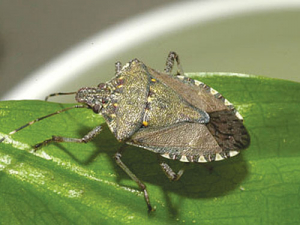These are normally landed in the spring in preparation for post-new year harvest and cultivation.
A large distributor of excavators tells Dairy News a ship carrying 200 machines has been returned to Japan with an infestation.
The pest -- Halymorpha halys (brown marmorated stink bug -- is native to China, Japan, Korea and Taiwan. Shield-shaped and measuring 17 x 17mm, it accidentally arrived in the US in 1998, and by 2014 had been seen in 41 of the 50 states. More recently it has appeared in Europe, notably in Italy and Romania.
This sucking insect uses a proboscis to pierce plants, causing dimpled (necrotic) areas on the surface of the leaves, leaf stippling and seed or fruit loss.
Hard to kill with normal pesticide because of its mobility, the pest quickly bounces back from spraying; it over-winters in homes or buildings, waiting for spring.
In Japan parasitic wasps are on trial to control the pest, but with caution.
Machinery distributors tell Dairy News all shipments from Europe and America are fumigated, and strict rules apply to pre-sailing wharf storage times for vehicles or containers.
Many large distributors operate authorised transitional facilities, allowing them to unload containers at their premises in a secure area, with trained staff. Containers are then moved direct from the port without MAF inspections, although roll on-roll off vehicles are checked.
If distributors find the pests they reseal containers or vehicles, tell MAF, and methyl bromide fumigation is rolled in.
Gerald van den Broek, operations manager for the Power Farming Group in NZ and AU, says all its logistics staff know the implications of pest invasions.
“They continually attend courses to learn what to look out for. We operate a policy of better safe than sorry, so we call MAF about anything we are not happy with. We’re in constant communication with our freight forwarders about vigilance at the point of departure‑.”
Ships cruise in, out
The stink bug issue has the potential to get worse fast, given the number of ship berthings required at Auckland and their vehicle-cargo numbers.
Arrival schedules show that in the next 33 days, 28 ships (pure car carriers - PCCs) will arrive with 40,000 vehicles.
At time of writing, the PCC Tokyo Car is unloading at Bledisloe Wharf and the PCC Sepang Express is anchored off awaiting berthing, fogging and inspection. Mitsui OSK Line says PCC Morning Christina has been berthed, fogged and inspected.
PCC Courageous Ace and Glovis Caravel have gone back to Singapore for treatment, a faster option than the estimated wait-to-land at Auckland -- the wait caused by MPI requiring 20% of cargo from every deck to be heat-treated and inspected, even though no live stink bugs are found.
MPI says treating and inspecting high-risk vessels can take 20-30 days per vessel due to the limits of the port’s heat treatment facility.
Vessels that did not berth at Singapore are unaffected by the stink bug issue and will be turned around in the usual times.
















